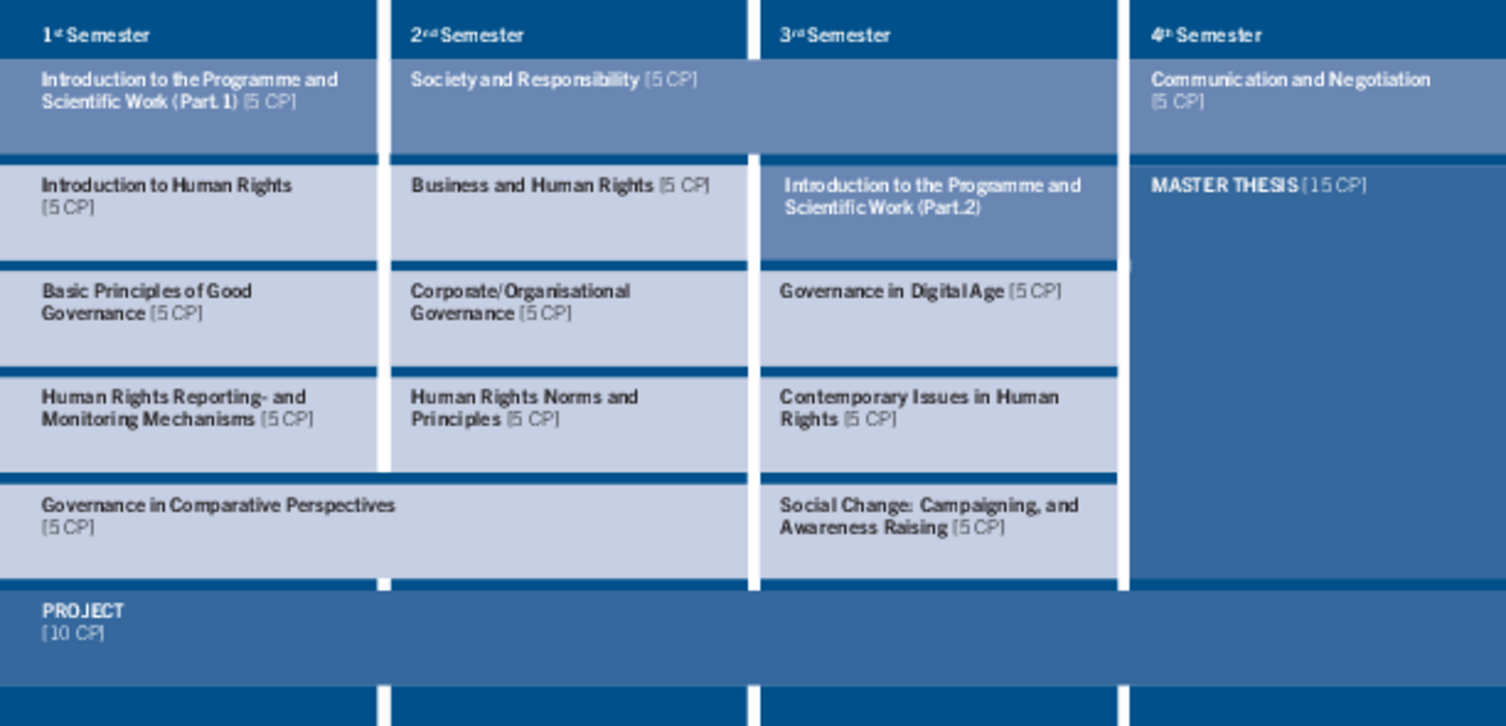Curriculum
The Masters Programme in Governance and Human Rights is a two-year distance learning online and part-time on-campus international Masters programme. It is a professional M.A. degree taught in English, aiming at empowering students and young professionals to understand and reflect the theoretical meaning and practical application of Governance in and through Human Rights. It addresses young professionals with a university degree, first work experience and a project idea which they seek to realise.
 ©Leuphana
©Leuphana
Project-based Learning informed by Theory and Practice
The Master of Governance and Human Rights combines theory and practice. Students will learn to analyse and understand legal and political theories of governance and international and regional human rights regimes and how they are interrelated.
The students and scholars of the Master of Governance and Human Rights will design, plan, organise and realise their own project addressing a practical challenge related to good governance and human rights. Project-based learning is at the core of this programme. Students will learn to conceptualise and contribute to social change and acquire the design and communication skills to adapt theoretical approaches to governance and human rights to their professional working environment, e.g. as part of corporate social responsibility (CSR) or sustainable development policies. They will be taught and supervised by outstanding and renowned international human rights academics, practitioners and experienced project coaches.
Subject modules
F1: Introduction to Human Rights (5 CP)
This introductory module offers a comprehensive overview of the evolution and the critical framworks of human rights:
- Introduction to norms and concepts of human rights
- Study of the genesis, development and normative content of the international human rights regime
F2: Basis principles of Good Governance (5 CP)
This course delves into the fundamental principles and practical aspects of good governance, a critical framework for effective and ethical public administration.
- Introduction to fundamental theories, concepts and principles of good governance
- Local, national and international contexts and the implementation of good governance working on the strengthening of human rights
F3: Human Rights Reporting and Monitoring Mechanisms (5 CP)
Module 3 delves into the monitoring and reporting mechanisms that uphold human rights at international, regional, and national levels.
- Understanding the protection of human rights through international and regional human rights regimes and their consideration in national, local and private decision-making and control mechanisms
- Human rights institutions, reporting and monitoring mechanisms
F4: Governance in comparative perspective (5 CP)
Module 4 examines governance within a global context, tracing the transition from state-centric to market- oriented decision-making and the impact of ideologies like the Washington Consensus. Through a comparative approach, students will assess governance practices across the Global North and South, focusing on participation, accountability, and legitimacy in public sector reform.
- Governance in comparative perspective
- Examine and compare different governance regimes across the globe through case studies
F5: Business and Human Rights (5 CP)
Module 5 explores the intricate relationship between the global economy and human rights, emphasizing the influence of multinational corporations and financial institutions. Students will delve into the UN Guiding Principles on Business and Human Rights, Corporate Social Responsibility, and sustainable practices within the economic sector.
- Recent developments and interdependencies between economy and human rights
- Impacts of multinational companies and international financial institutions on human rights
F6: Corporate/Organisational Governance (5 CP)
The students learn to implement the principles of human rights-based governance in political guidelines and strategies of organisations and institutions in the private and public sector.
- Strategic development and orientation of companies and organisations with regard to the protection and strengthening of human rights
- Case studies and development of good practice examples for the implementation of human rights and the consideration of human rights in the sense of good corporate governance
F7: Human rights norms and principles (5 CP)
Exploring the intersection of human rights governance and globalization, this module addresses the tailored rights of women, children, migrants, and persons with disabilities. Students will analyse the international standards governing these rights, confront the challenges in their enforcement and implementation, and examine the impact of global dynamics on vulnerable populations.
- Human rights regimes protecting specific groups
- Case studies and development of best practice scenarios to implement human rights
F8: Governance in Digital Age (5 CP)
This module investigates the transformative role of Information and Communication Technologies (ICTs) in governance and the promotion of human rights.
- Electronic and internet governance theories
- Digital sovereignity
- Human rights and access and digital divide
- Artificial intelligence, internet politics and cybercriminality and -safety
F9: Contemporary Issues in Human Rights (5 CP)
This module offers an in-depth analysis of current global challenges in human rights, blending theoretical knowledge with emerging issues like conflict, public health, and economic globalization. It emphasizes dynamic, up-to-date content to reflect the evolving landscape of international human rights law and its application.
- Understanding current human rights topics in specific areas like war or health
- Understanding political dynamics
- Transitional justice
- Human rights critique
F10: Social Change: Campaigning, and Awareness Raising (5 CP)
This module delves into the strategic facets of human rights advocacy, offering a transdisciplinary approach to campaigning and awareness-raising. It equips students with the tools for developing, executing, monitoring, and evaluating campaigns that can influence the public and steer policy changes.
- Organisation of campaigns and awareness raising
- Communication through and usage of networks in order to protect and establish human rights
- Organisation and communication to support and stimulate social change
P: Individual Project (10 CP)
Student projects are a fundamental and unique component of the Programme Master of Governance and Human Rights. They link theory and practice and enable students to apply their knowledge and analytical skills to real-life challenges related to their professional field or the field, where they want to become active.
- Work on a project in the fields of governance and human rigts
- Organisation of a conference together with the entire class on a chosen issue
Complementary studies
C1: Introduction to the Programme and Scientific Work (5 CP)
This module focuses on the academic, organisational and technical underpinnings essential for the programme:
- Introduction to scientific work
- Master's thesis preparation
C2: Communication and Negotiation (5 CP)
This course enhances students' communication and negotiation abilities, focusing on practical application through interactive phases, including online lectures and hybrid workshops. It covers the essentials of negotiation, from understanding different perspectives to developing strategies for collaborative solutions. The course aims to build not only knowledge but also the practical skills and mindsets necessary for effective real-life negotiations, particularly in diplomatic and humanitarian contexts.
- Techniques for problem analysis and problem solution with a special focus on human rights based governance
- Communication and negotiation
- Understanding of complex situations and problems
- Empathy
- Understanding of political and social dynamics
C3: Society and Responsibility (5 CP)
In this module you are dealing with the interdependencies of organisations and its members. There will be three course sections:
- Leadership and Responsibility
- Change Management
- Ethics and Values
Masters Thesis
Preparation Master Thesis/ supervision (15 cp)
The Students will write their Master Thesis on one of the topics, which they find most interesting. It can be related to their practical project or it can deal with another matter. It is important that students use academic writing skills to outline their ideas and solutions. Students are encouraged to publish and to try to reach the public with their learning outcomes in the form of a publication, a campaign or a strategy. They could further jointly set up a public event in Lüneburg or elsewhere in the world.
Videos from the Masters Governance and Human Rights
Governance through Human Rights - a solution for global crises?
Keynote speeches during the first session
Contact & Advising
Programme Coordinator
Dr. Iryna Shkura
Universitätsallee 1, 40.121
21335 Lüneburg
Fon 04131.677-2942
gahr@leuphana.de
E-mail contact
Please feel free to contact us via gahr@leuphana.de.
Programme Director
- Prof. Dr. Till Patrik Holterhus MLE. LL.M. (Yale)

